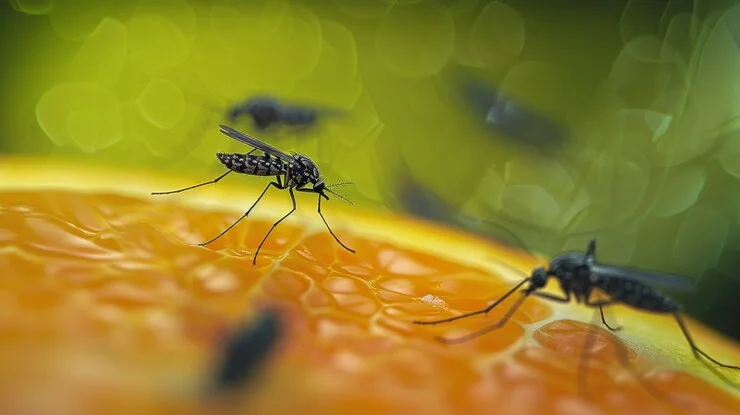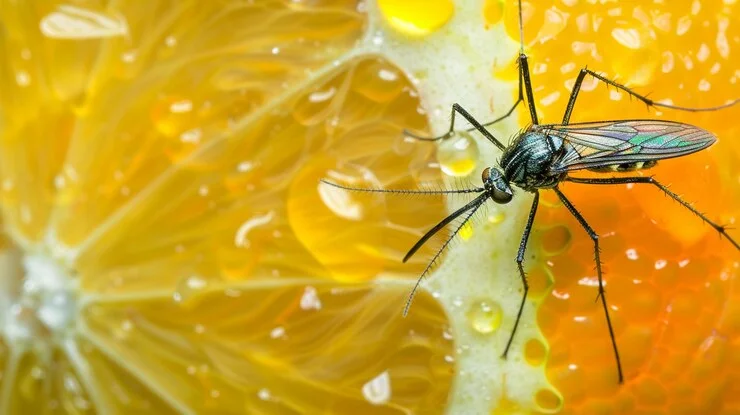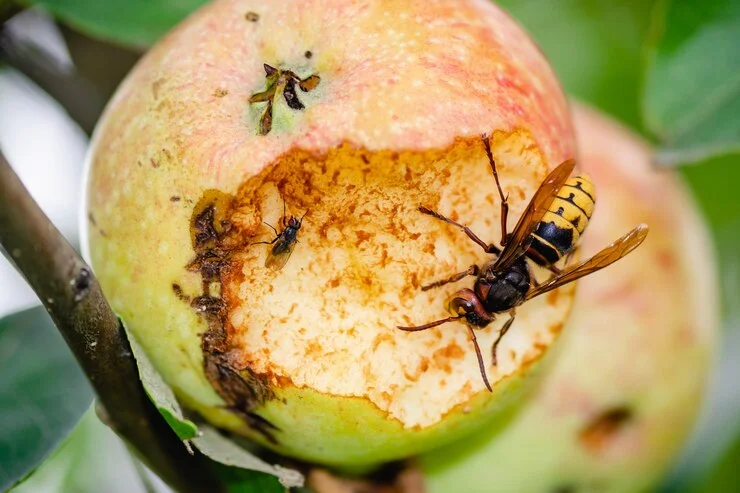Table of Contents
Simple home remedies to Get rid of Fruit flies

Dealing with fruit flies can be frustrating, but you don’t need fancy products to get rid of them. There are many simple, effective remedies that you can prepare using things you already have at home. Here’s how you can deal with these pesky bees with simple solutions: source

1. Apple Cider Vinegar Trap
This is a classic and very simple method. All you need is apple cider vinegar, dish soap, and a bowl or jar.
Procedure:
- 1. Pour some apple cider vinegar into a small bowl or jar.
- 2. Add a few drops of dish soap. This breaks the surface tension of the vinegar so the flies drown and cannot escape.
- 3. Optionally, cover the bowl with plastic wrap and poke a few small holes. Fruit flies will be drawn in, but not back out.
2. Red Wine Trap
Have some leftover red wine? This method is the best method to use when catching fruit flies.
Procedure:
- 1. Pour some red wine into a bowl or jar.
- 2. Cover with plastic wrap and poke some holes. The fermenting smell of the wine will attract the flies, and they will be trapped.
3. Fruit Fly Bait
Overripe fruit is a magnet for fruit flies. If you have any old fruit lying around, put it to use.
Procedure:
- 1. Place a piece of overripe fruit in a bowl or jar.
- 2. Cover with plastic wrap and poke holes. Fruit flies will be attracted to the fruit and become trapped.
4. Baking soda and vinegar
A mixture of baking soda and vinegar can help combat fruit fly larvae, especially in drains.
Procedure:
- 1. Mix 1/4 cup baking soda with 1/4 cup white vinegar in a bowl.
- 2. The phasing action helps clear potential breeding grounds in your drains. Pour this mixture into your sink and let it sit for a while.
5. Lemon and Clove
It’s more about retraction than trapping, but it works well if you have the ingredients.
Procedure:
- 1. Cut a lemon into slices.
- 2. Stick whole cloves in lemon slices.
- 3. Place them around areas where fruit flies are hanging out. The scent of cloves will help keep them away.
6. Milk, Sugar, and Pepper Trap
This is a bit of an old school treatment but can be quite effective.
Procedure:
- 1. Heat a cup of milk and stir in 1/4 cup of sugar until it dissolves.
- 2. Pour the mixture into a shallow dish.
- 3. Sprinkle some black pepper on top. Fruit flies will be attracted to the sweet milk and become trapped in the pepper.
7. Essential Oils
Essential oils can act as a natural deterrent to fruit flies.

Procedure:
- 1. Fill a spray bottle with water.
- 2. Add 10-15 drops of essential oil (such as eucalyptus, lavender, or peppermint).
- 3. Shake well and spray around areas where you see fruit flies. A strong scent will keep them away.
Additional Tips
- Keep things clean:Clean surfaces regularly and throw away overripe fruit to reduce attraction.
- Check for hiding spots:Find and clean up any potential breeding spots, such as spills or food scraps in hidden areas.
By using these simple methods and keeping your house clean, you can keep fruit flies at bay without much trouble.
What causes fruit fly infestations indoors?
Fruit flies are small, but they can quickly become a big problem if they invade your home. Understanding what attracts these little bugs can help you prevent and manage infestations. Here’s a look at what causes fruit fly infestations indoors and how you can deal with the problem.
1. Overripe or rotting fruit
A major culprit behind fruit fly infestations is over-ripening or rotting of the fruit. Fruit flies are attracted to the aroma of fermenting fruit, which is a food source for them. Even a piece of fruit that has gone bad can become a breeding ground for these flies.
How to Prevent: Check your fruit bowl and refrigerator regularly for overripe or rotting produce. Dispose of any spoiled fruit immediately and store fresh fruit in the refrigerator or in sealed containers.
2. Food scraps and spills
Fruit flies are also drawn to food scraps and spills. Crumbs on the counter, sticky sprinkles on appliances, and leftover food can attract fruit flies. They are particularly fond of sugary or fermented food particles.
How to Prevent: Keep your kitchen and dining areas clean. Clean countertops, wipe spills promptly, and be sure to sweep or vacuum regularly to remove any crumbs or food residue.
3. Sewage and Garbage
Fruit flies can breed in drains and garbage disposals where food particles often accumulate. These areas provide a moist, organic environment for fruit fly larvae.
How to Prevent: Clean your sink and drains regularly. Use a drain cleaner or a mixture of baking soda and vinegar to keep drains free of food build-up. Be sure to empty and clean your trash and compost bins frequently.
4. Unsealed food containers
If food is left in unsealed containers or stored improperly, it can attract fruit flies. They can easily find their way into open containers or packaging, especially if the food is sweet or fermented.
Prevention Method: Use airtight containers to store food and be sure to seal the packaging tightly. Avoid leaving food uncovered, especially in areas where fruit flies are a known problem.
5. Overripe vegetables and compost bins

Just like fruit, overripe or rotting vegetables can attract fruit flies. Compost bins, where organic matter decomposes, are another common breeding ground for these pests.
How to Prevent: Check and rotate your vegetables regularly, and fertilize if you use one. Make sure compost bins are covered and properly managed to avoid attracting fruit flies.
6. Hidden Breeding Sites
Fruit flies are small and can breed in hidden places. Spaces behind appliances, under refrigerators, or floor cracks can trap food particles and moisture, providing an ideal environment for fruit flies to lay eggs.
How to Prevent: Clean the bottom and back of the appliance regularly. Check for hidden food debris and maintain good hygiene in your kitchen.
7. Fermented Beverages
Spilled or discarded alcoholic beverages and fermented beverages can also attract fruit flies. The smell of fermenting alcohol can be intolerable to them.
How to Prevent:Clean up alcoholic beverage spills immediately and dispose of empty bottles and cans regularly.
Conclusion
Indoor fruit fly infestations often begin with overripe or rotting fruit, food scraps, dirty drains, unsealed food containers, overripe vegetables, hidden breeding sites, and fermented beverages. To keep fruit flies at bay, it’s important to maintain a clean house, store food properly, and address any potential breeding grounds. Regular cleaning and proper food management can significantly reduce the risk of these pests and make for a more comfortable living space.
Additionally, a variety of effective treatments can help you deal with fruit flies. From using common kitchen ingredients to natural repellants, these methods can help you regain control of your home. By combining regular maintenance with simple traps, you can keep fruit flies at bay and ensure a more pleasant environment.
Here’s an FAQ section on how to get rid of fruit flies:
FAQs: How to Get Rid of Fruit Flies
1. What are fruit flies?
- Fruit flies are small, common pests that are attracted to ripening or fermenting fruits and vegetables. They are often identified by their tan or yellowish bodies and red eyes.
2. Why do I have fruit flies in my home?
- Fruit flies are typically attracted to overripe or rotting fruit, vegetables, and other organic materials. They can also breed in drains, garbage disposals, and compost bins where food residue is present.
3. How can I prevent fruit flies from entering my home?
- To prevent fruit flies, store fruits and vegetables in the refrigerator, seal food containers, regularly clean your kitchen, and ensure that garbage cans are tightly covered.
4. What are some effective traps for catching fruit flies?
- Vinegar Trap: Pour apple cider vinegar into a bowl, cover it with plastic wrap, and poke small holes in the top. Fruit flies will be attracted to the vinegar and get trapped.
- Wine or Beer Trap: Leave a small amount of leftover wine or beer in a bottle. The fruit flies will be drawn in and unable to escape.
- Paper Cone Trap: Place a piece of fruit in a jar, then roll a paper cone and insert it into the jar’s opening. The flies will enter but won’t be able to exit.
5. How can I get rid of fruit flies without using chemicals?
- Many natural methods can effectively eliminate fruit flies, such as using traps with vinegar, fruit, or wine, and keeping surfaces clean to remove breeding sites.
6. What should I do if the infestation is severe?
- If you have a large infestation, intensify your cleaning efforts by disposing of all overripe or rotting fruit, cleaning kitchen surfaces, and setting multiple traps. You may also need to inspect areas like drains and garbage disposals for breeding sites.
7. How long does it take to get rid of fruit flies?
- The time it takes to eliminate fruit flies can vary depending on the severity of the infestation and the effectiveness of your control measures. With consistent effort, you can usually see a significant reduction in a few days to a week.
8. Can fruit flies harm my health?
- While fruit flies are not directly harmful, they can contaminate food with bacteria as they feed. It’s best to eliminate them to maintain a clean and healthy environment.
9. How can I clean surfaces to prevent fruit flies?
- Regularly clean countertops, cutting boards, and sinks with a mixture of soap and water or a vinegar solution. Pay special attention to areas where food residue may accumulate.
10. When should I call a pest control professional?
- If you’ve tried multiple methods to get rid of fruit flies without success or if the infestation persists for an extended period, it may be time to consult a pest control professional for further assistance.
This FAQ section provides practical answers to common questions about dealing with fruit flies, helping individuals effectively manage and eliminate these pests.

